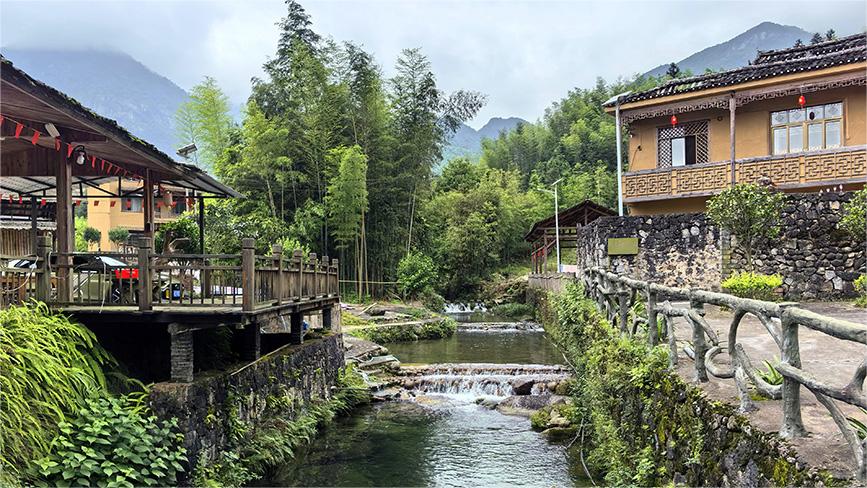Septuagenarian afforests 160 hectares of sandy land in NE China's Liaoning
Hou Gui, a man in his 70s, has planted more than 200,000 trees on 2,400 mu (160 hectares) of sandy land over the past 23 years, transforming harsh sand dunes into a lush forest in Liujia village, Sihecheng township, Zhangwu county, northwest China's Liaoning Province.
Liujia village is located on the southern edge of the Horqin sandy land, which is China's largest sand area that is not classified as a desert. Over 20 years ago, this village was plagued by heavy winds and floating sand all year round.

Hou Gui checks the trees in his forest in Liujia village, Sihecheng township, Zhangwu county, northwest China's Liaoning Province. (People's Daily/Liu Hongchao)
"Back then, our village was surrounded by sand dunes on three sides. Whatever seeds we planted would either be blown away or buried the next day," Hou recalled. "We realized that if we couldn't find a solution soon, not only would our farmland be swallowed by the sand, but our village would also be slowly engulfed."
In 2001, Hou built a small adobe house in a sheltered spot deep within the sand dunes, and started to plant trees in contracted sandy land in response to a call by the government encouraging people to develop the area.
"Apart from being sheltered from the wind, the main advantage of this place is that we could dig a well and have access to water," he said, explaining why he decided to move to such a location so remote that it took over an hour to walk across several sand dunes whenever he needed to bring something from home.
Hou's afforestation journey was bumpy and difficult. He bought seeds and mixed them with fertilizer in pots he collected to cultivate seedlings in a bid to save on the cost of saplings; carried fertilizer bags full of soil from his own vegetable garden to fill the tree pits; and carried two buckets of water on a shoulder pole to water trees one by one with a bailer.
In the first year of his journey, Hou planted over 400 poplar trees, which were all uprooted by a strong wind. "Many trees had to be planted three or four times before they took root," he recalled.
After using up all his meager savings to buy tree seeds, Hou found that the few hundred saplings he could cultivate were just a drop in the bucket for the over 2,000 mu of sand dunes, and the amount of bank loans he could get was not enough to buy the rest of the tree seeds he needed.
Hearing that experts at Liaoning Academy of Agricultural Sciences were skilled in cultivating tree seedlings through cuttings, Hou took a bus for over three hours to the institute to learn the techniques.
"We cut small sections of branches about 10 centimeters long from the trees in early March every year, and then plant them in a greenhouse. Once the temperature rises, we can transplant them into the ground," Hou said, sharing his experience with others.
As more and more saplings took root around Hou's small adobe house, the greenery in the sand dunes surrounding his house expanded in circles, gradually forming a 2,400-mu beautiful green tapestry with over 200,000 trees.
The forest created by Hou is filled with chirping insects and singing birds. Poplar trees, pine trees, and other tree species cover the sky, while various shrubs and weeds grew beneath them, adorned with wildflowers.
Hou's living conditions in the forest have also improved significantly. With the support of the local government, a dirt road was built to the forest, electricity was supplied, and his drafty adobe house has been transformed into a brick house.
Despite his advanced age, Hou can still walk briskly through the trees. He patrols the forest and checks the nursery behind his forest house whenever he has time.
Considering that the tree species he planted were relatively limited and some trees are infested with pests and diseases, Hou is trying to plant new tree species that are drought-resistant and disease-resistant, such as Scotch pine and Shandong maple, aiming to keep the sand dunes green forever.
Over the past 23 years, many people have offered to buy the trees that Hou planted early on, but he refused them all.
"I don't plant trees to make money. As long as I can walk, I will continue to plant trees. And when the day comes that I can no longer walk, I will donate this forest to our country," Hou said.
Photos
Related Stories
- Former lumberjacks and lumberyards in NE China embrace change amid national trend toward ecological conservation
- National Ecology Day special: Saihanba's green tales for the world
- China's Sanming embraces green transformation to boost rural tourism
- Natural scenery of Makehe primitive forest farm in Qinghai
- Forest of endangered trees found in SW China
- Fuxin city in NE China's Liaoning sees remarkable success in desertification control
- In pics: Explore ecological beauty of forests in the Great Khingan Mountains
- Fire prevention, control work reinforced to avoid potential forest risks in SW China
- Green efforts gain more ground
- Logging ban sparks nature's rebirth in China's Khingan Mountains
Copyright © 2024 People's Daily Online. All Rights Reserved.









